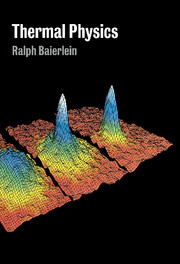Book contents
- Frontmatter
- Contents
- Preface
- 1 Background
- 2 The Second Law of Thermodynamics
- 3 Entropy and Efficiency
- 4 Entropy in Quantum Theory
- 5 The Canonical Probability Distribution
- 6 Photons and Phonons
- 7 The Chemical Potential
- 8 The Quantum Ideal Gas
- 9 Fermions and Bosons at Low Temperature
- 10 The Free Energies
- 11 Chemical Equilibrium
- 12 Phase Equilibrium
- 13 The Classical Limit
- 14 Approaching Zero
- 15 Transport Processes
- 16 Critical Phenomena
- Epilogue
- Appendix A Physical and Mathematical Data
- Appendix B Examples of Estimating Occupation Numbers
- Appendix C The Framework of Probability Theory
- Appendix D Qualitative Perspectives on the van der Waals Equation
- Index
10 - The Free Energies
Published online by Cambridge University Press: 05 June 2012
- Frontmatter
- Contents
- Preface
- 1 Background
- 2 The Second Law of Thermodynamics
- 3 Entropy and Efficiency
- 4 Entropy in Quantum Theory
- 5 The Canonical Probability Distribution
- 6 Photons and Phonons
- 7 The Chemical Potential
- 8 The Quantum Ideal Gas
- 9 Fermions and Bosons at Low Temperature
- 10 The Free Energies
- 11 Chemical Equilibrium
- 12 Phase Equilibrium
- 13 The Classical Limit
- 14 Approaching Zero
- 15 Transport Processes
- 16 Critical Phenomena
- Epilogue
- Appendix A Physical and Mathematical Data
- Appendix B Examples of Estimating Occupation Numbers
- Appendix C The Framework of Probability Theory
- Appendix D Qualitative Perspectives on the van der Waals Equation
- Index
Summary
This chapter has several goals. One is to increase your understanding of the chemical potential. Another is to describe the changes that arise in basic thermodynamic laws when particles may enter or leave “the system.” A third goal is to study additional properties of the Helmholtz free energy, which first appeared in chapter 7. And a fourth goal is to introduce another free energy, the Gibbs free energy, and to explore its properties. Clearly, a lot is going on, but the section structure should enable you to maintain your bearings.
Generalities about an open system
In this section, we examine changes that arise in basic thermodynamic laws when particles may enter (or leave) what one calls “the system.” What might be examples of such entering or leaving? The migration of ions in an aqueous solution provides an example. So does the motion of electrons from one metal to another at a thermocouple junction. When one studies the equilibrium between argon in the gaseous phase and argon adsorbed on glass (as we did in section 7.4), one may take the adsorbed atoms to constitute “the system.” Then atoms may enter the system from the vapor phase and also leave it. The coexistence of two phases–solid, liquid, or vapor–provides a final example in which one may take a specific phase as “the system.” Atoms or molecules may enter that phase or leave it.
- Type
- Chapter
- Information
- Thermal Physics , pp. 222 - 243Publisher: Cambridge University PressPrint publication year: 1999

